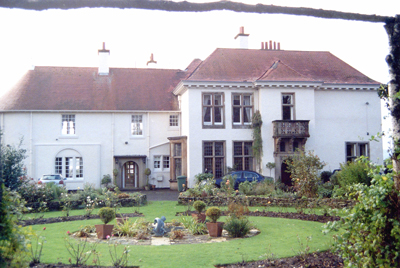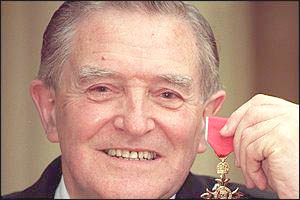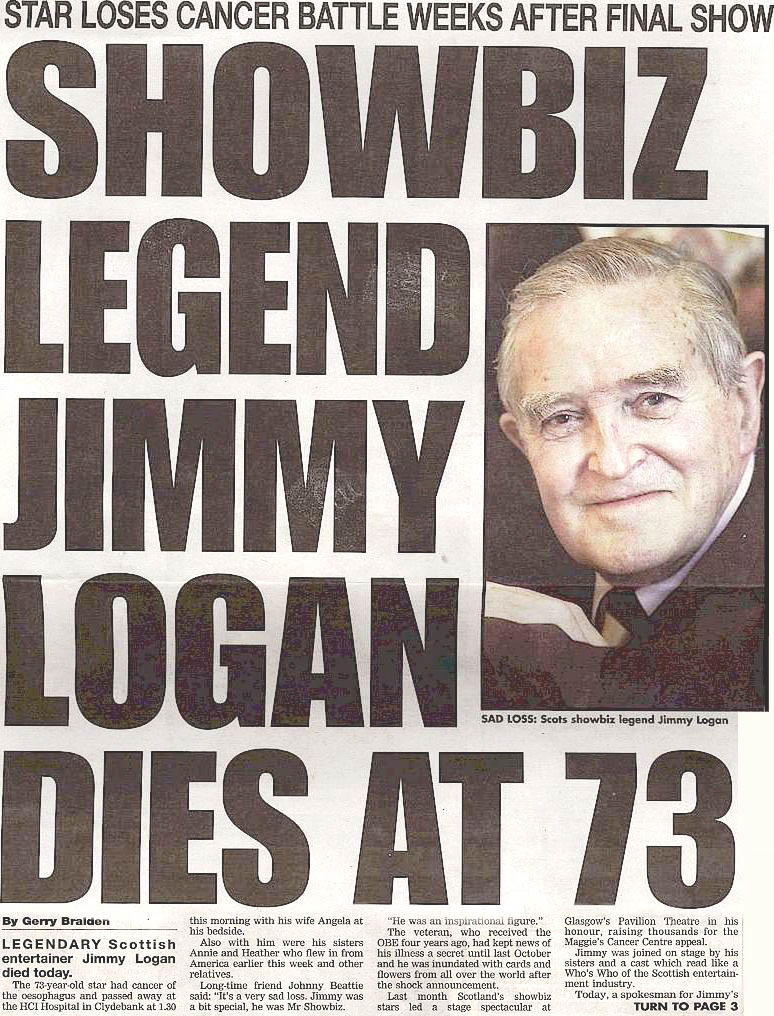HELENSBURGH man Jimmy Logan OBE — a world famous and colourful Scottish actor and entertainer — served until his death in 2001 as the first honorary president of Helensburgh Heritage Trust and took a keen interest in the work of the Trust.
Jimmy Logan's connections with Helensburgh go back even to the time before he was born, as it was in Helensburgh that his parents, Jack Short and May Dalziel, met each other.
They formed a successful show business partnership and it was natural that Jimmy would follow in their footsteps.
Jimmy was born as James Allan Short but after entering showbusiness he took on the name of Jim Logan — it became Jimmy later — because, in his own words, "my father soon decided it wasn't a good idea to have the same name as him because the audience wouldn't think they were getting their money's worth", and it was later under the name of Jimmy Logan that he was subsequently known to everyone.
Over the years he became, in the words of his obituary writers, "a consummate performer and inspiration to many entertainers" (The Herald) and "a gentleman, a very generous man, and one of Helensburgh's best loved residents" (Helensburgh Advertiser).
Jimmy was born in Glasgow on April 4 1928 — the same year as Mickey Mouse, as he pointed out — and he first appeared on stage at the age of 12, although his career in the theatre actually started at the age of seven as during holidays he would sell programmes, chocolates and cigarettes at his father's summer show in Northern Ireland.
He left school at 14 with no qualifications, but already certain that his future lay in the world of entertainment. His belief in himself was justified, as his natural flair for comedy was so great that by the age of 19 he was principal comedian at the Metropole Theatre in Stockwell Street, Glasgow.
His career instantly blossomed and he soon started a ten-year run in the famous "Five Past Eight" show at the Alhambra Theatre in the city. He also appeared on the first night of Scottish Television in 1956.
Although he was principally known as a comedian and entertainer in his earlier days, he nevertheless showed his abilities as a dramatic actor in his first film "Floodtide" at the age of 21.
The trappings of success followed rapidly, and while in his twenties he was living in a wing of Culzean Castle in Ayrshire, had his own Rolls-Royce with personalised number plate, and flew his own plane. It seemed that nothing could go wrong, but it did.
He wanted to be not just an actor, but an actor-manager, in the best old traditions of the theatre. Consequently in 1964 he bought the old Empress Theatre at St George's Cross in Glasgow, refurbished it and renamed it the Metropole, having paid £80,000 for it.
He knew that the theatre itself would probably lose money, but he believed that by building a complex of bars and restaurants with entertainment on the plot next door, he could subsidise the losses of the theatre. However planning permission was refused for this and over the years the Metropole ran at a loss.
Finally in 1973 the bank pegged his overdraft at £170,000 and so he had to close the theatre . . . in his own words "my responsibilities to the building and my debts were destined to crush me for another decade."
His first marriage of 21 years standing had already failed in 1969, and he believed that his financial problems played a large part in the failure of his second marriage. Consequently at the age of 49 he now also lost his home and all that he owned.
As a result, for the next two years he slept on the settee in his father's one-bedroom flat in Ibrox, and hung his clothes on the back of the upright piano. However, typically, Jimmy Logan bounced back.
He was making more and more of a name for himself as a serious actor, and even wrote and performed in a one-man play on Sir Harry Lauder, one of his great heroes. But even then, life was not always kind to him.
At the age of 20 he had married a dancer, Grace Pagan. When that marriage was dissolved in 1969 he married a world famous fashion designer Gina Fratini; this marriage lasted eight years. In 1985 he married Pamela Donald and the following year twins were born.
 Jimmy was delighted as he believed them to be his first children and three years later the family moved to part of 152 East Clyde Street in Helensburgh (pictured left).
Jimmy was delighted as he believed them to be his first children and three years later the family moved to part of 152 East Clyde Street in Helensburgh (pictured left).
However this marriage too broke up when Pamela walked out, taking the twins who Jimmy adored.
Worse was to follow. During the subsequent divorce Pamela insisted on DNA tests which eventually revealed that Jimmy was not the biological father of the twins.
Jimmy was distraught, but with typical courage bounced back, helped by his sister, the famous jazz singer, Annie Ross, who flew over from the USA to be with him for several months.
He was also helped by sympathetic neighbours, especially Angela Mackenzie who lived in the east wing of the house — she later became his driver and dresser during his continuing career.
The separation meant selling his house, a move to Springvale, 73 East Princes Street, in 1990, and disposing of his wonderful collection of Harry Lauder memorabilia. This loss was a gain for the University of Glasgow and the people of Scotland as these items now form part of the Logan Theatre Collection in the University Library, thanks to the MacFarlane Trust.
In 1993 his divorce was complete, he survived a quadruple heart bypass, and then to the delight of his friends he married Angela and they enjoyed eight years of happy life together. Typically of Jimmy he continued to cherish "his" now distant twins.
Jimmy continued to raise money for charity; Erskine Hospital for disabled ex-servicemen and women was a favourite because he had been so impressed with the treatment which his father had received there when he had had to have a leg amputated.
 Jimmy's career had taken him to the Albert Hall in London and to the Carnegie Hall in New York; but he still continued to take part in his real love, pantomime. Latterly he performed regularly at the Pitlochry Festival Theatre, one summer revelling in performing three very different plays on successive nights.
Jimmy's career had taken him to the Albert Hall in London and to the Carnegie Hall in New York; but he still continued to take part in his real love, pantomime. Latterly he performed regularly at the Pitlochry Festival Theatre, one summer revelling in performing three very different plays on successive nights.
In 1988 the Royal Scottish Academy of Music and Drama made him a Fellow and, as a consequence, in his words "in a way I became respectable"! In 1994 he was granted the honorary degree of Doctor of Letters by Glasgow Caledonian University, and then in 1996 he was awarded the OBE.
 When Helensburgh Heritage Trust was set up the same year, he became its first Honorary President, and he contributed a piece on another great entertainer from Helensburgh, Jack Buchanan, another of his great heroes, for the Trust’s bicentenary book, “200 Years of Helensburgh”.
When Helensburgh Heritage Trust was set up the same year, he became its first Honorary President, and he contributed a piece on another great entertainer from Helensburgh, Jack Buchanan, another of his great heroes, for the Trust’s bicentenary book, “200 Years of Helensburgh”.
It was while performing at the Pitlochry Festival Theatre in the summer of 2000 that he learnt that he had incurable cancer. Typically he carried on acting until the end of the season before making the news public.
In March 2001 Scotland's show business stars led a stage spectacular, "A Celebration for Jimmy Logan", in his honour at Glasgow's Pavilion Theatre, and it was sold out even before the box office opened! During this event he made his last appearance on stage.
Jimmy set up the Jimmy Logan for Cancer Trust to deal with the £30,000 raised by the occasion.
He began the arrangements to produce videotapes to be made available to newly diagnosed cancer sufferers to console them, but he died on Good Friday, April 13, 2001 in the Health Care International Hospital (now the Golden Jubilee Hospital) in Clydebank.
The following Thursday a memorial service was held for him in Glasgow Cathedral — once again he had a packed house.
During the service he was given a round of applause because Billy Connolly, who was inspired to take up entertainment by watching Jimmy, believed it was more appropriate than a minute's silence.
In 1998 he produced his best-selling autobiography, aptly entitled "It's a Funny Life".
- Main photo by courtesy of the Iain Gordon Collection. Photo of 152 East Clyde Street by Donald Fullarton. Cutting from Glasgow Evening Times.




